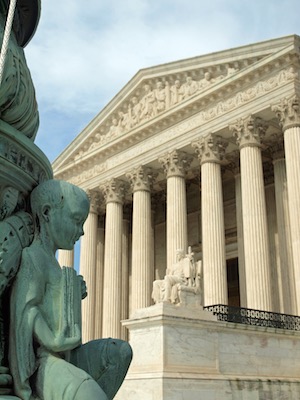“The U.S. Supreme Court should reverse the decision of the Federal Circuit and confirm that APJs of the PTAB are merely inferior officers of the United States who were, therefore, constitutionally appointed.”
 On December 2, eComp Consultants (eComp) filed an amicus brief urging the U.S. Supreme Court to find Administrative Patent Judges (APJs) of the Patent Trial and Appeal Board (PTAB) in U.S. v. Arthrex, Inc., Nos. 19-1434/-1452/-1458.
On December 2, eComp Consultants (eComp) filed an amicus brief urging the U.S. Supreme Court to find Administrative Patent Judges (APJs) of the Patent Trial and Appeal Board (PTAB) in U.S. v. Arthrex, Inc., Nos. 19-1434/-1452/-1458.
In Arthrex, Inc. v. Smith & Nephew, Inc., 941 F.3d 1320 (Fed. Cir. 2019), a Federal Circuit panel declared that “the statute [Title 35 of the U.S. Patent Act] as currently constructed makes the APJs principal officers” and held that the APJs were thus appointed in violation of the Appointments Clause of the U.S. Constitution, U.S. Const. art. II, § 2, cl. 2. See 941 F.3d at 1325. Since then, the Federal Circuit in over 100 cases, including Polaris Innovations Ltd. v. Kingston Tech. Co., 792 F. App’x 820 (Fed. Cir. 2020) (per curiam), has continued to apply Arthrex I to summarily vacate, reverse, and remand final written decisions of the PTAB APJs in inter partes reviews (IPRs) issued on or before October 31, 2020.
In its brief, eComp argues that the U.S. Supreme Court should reverse the decision of the Federal Circuit and confirm that APJs of the PTAB are merely inferior officers of the United States who were, therefore, constitutionally appointed. eComp’s Amicus Brief clarifies the errors in the Federal Circuit’s decision.
Precedent Has Repeatedly Held Officers in Question Were Inferior Officers
First, eComp argues that the U.S. Supreme Court’s precedent makes clear, and there is no dispute, that PTAB APJs are “officers” of the U.S. because they “exercise significant authority.” Buckley v. Valeo, 424 U.S. 1, 125-26 (1976). eComp specifically points out that none of the U.S. Supreme Court decisions relied upon by the Federal Circuit panel found an administrative judge to be a “principal” officer. Rather, each of the cases concluded that the official in question was an “inferior” officer.
Narrow Analysis of Edmond
In addition, eComp claims that the Federal Circuit misapplied Edmond v. United States, 520 U.S. 651 (1997), which is the U.S. Supreme Court’s leading case on distinguishing principal from inferior officers for Appointment Clause purposes. In Edmond, the U.S. Supreme Court recognized that it has “not set forth an exclusive criterion for distinguishing between principal and inferior officers for Appointment Clause purposes.”. Instead of considering whether PTAB APJs are, given the totality of the circumstances, inferior officers “whose work is directed and supervised at some level by others who were appointed by presidential nomination with the advice and consent of the Senate,” eComp argues that the Federal Circuit distilled Edmond’s facts to erroneously devise a three-factor test to be tallied and mechanically applied.
Supervision and Direction of the Secretary of Commerce and USPTO Director over APJs
Additionally, eComp argues that the Federal Circuit’s analysis failed to fully account for the extent of the USPTO Director’s supervisory powers over PTAB APJs and to appreciate Congress’ intent in its Patent Act statutory changes addressing APJ Appointments Clause issues. While eComp recognizes that the Federal Circuit panel properly noted that the Director of the USPTO “exercises a broad policy-direction and supervisory authority over the APJs,” eComp argues the panel’s analysis failed to give due weight to the directorial and supervisory powers the Secretary and Director—both of whom are principal officers—have over the PTAB APJs.
Congress’s Deliberate Decision
Furthermore, eComp reasons that the fact that Congress expressly changed the method of appointment of PTAB APJs to be consistent with inferior officers, and later ratified that change in Section 6 of the Patent Act, reflects a clear congressional intent that PTAB APJs should be considered inferior officers.
The Conclusion is Clear
eComp concludes that the Federal Circuit panel erred in rigidly applying the three factors it plucked from Edmond, in addition to improperly evaluating whether PTAB APJs’ work is sufficiently “directed and supervised” by principal officers. Instead, in view of Congress’s intent and when all of the existing control mechanisms are considered together, eComp argues that it is clear that the work of APJs is sufficiently directed and supervised by a superior officer to characterize them as inferior officers.
Charles R. Macedo is principal counsel and David P. Goldberg and Chandler E. Sturm are additional counsel for eComp on the brief. Ivan Zatkovich is the Principal Consultant for Technology and IP Consulting for eComp.
Image rights acquired through AdobeStock.

![[IPWatchdog Logo]](https://ipwatchdog.com/wp-content/themes/IPWatchdog%20-%202023/assets/images/temp/logo-small@2x.png)

![[[Advertisement]]](https://ipwatchdog.com/wp-content/uploads/2023/01/2021-Patent-Practice-on-Demand-1.png)



![[Advertisement]](https://ipwatchdog.com/wp-content/uploads/2024/04/UnitedLex-May-2-2024-sidebar-700x500-1.jpg)
![[Advertisement]](https://ipwatchdog.com/wp-content/uploads/2024/04/Artificial-Intelligence-2024-REPLAY-sidebar-700x500-corrected.jpg)
![[Advertisement]](https://ipwatchdog.com/wp-content/uploads/2024/04/Patent-Litigation-Masters-2024-sidebar-700x500-1.jpg)

![[Advertisement]](https://ipwatchdog.com/wp-content/uploads/2021/12/WEBINAR-336-x-280-px.png)
![[Advertisement]](https://ipwatchdog.com/wp-content/uploads/2021/12/2021-Patent-Practice-on-Demand-recorded-Feb-2021-336-x-280.jpg)
![[Advertisement]](https://ipwatchdog.com/wp-content/uploads/2021/12/Ad-4-The-Invent-Patent-System™.png)






Join the Discussion
8 comments so far.
Joe Williams
December 5, 2020 12:09 am@Prosay #4
I sent the link you posted to a few with different tolerances of ‘other peoples problems’ in our industry..
Previously, I have attempted to use regulations.gov as a material timestamp myself.
ipguy
December 4, 2020 03:37 pmExactly what administrative judges seems to be in flux these days. See, e.g., immigration judges. Trump’s DOJ is saying they are “managers.”
“On August 9, 2019, DOJ petitioned the Federal Labor Relations Authority (FLRA) in an attempt to strip immigration judges of their right to unionize. DOJ claims that the National Association of Immigration Judges (NAIJ) is no longer a valid union because the judges are managers who can’t form unions under the Federal Service labor-Management Relations statute. DOJ cited a series of “factual and legal developments” it says have added managerial weight to the judges’ authority and rendered moot the FLRA’s 2000 ruling rejecting the Executive Office for Immigration Review’s bid to break up the union.
On July 31, 2020, the FLRA issued a decision rejecting EOIR’s petition to decertify the NAIJ – “IJs are not management officials within the meaning of section 7103(a)(11) of the Statute and EOIR’s petition is dismissed.”
On November 2, 2020, the Federal Labor Relations Authority issued a decision and order on review, and overruled the July 31, 2020, regional director’s decision and concluded that EOIR immigration judges are management officials, and stripped more than 450 federal employees of their collective bargaining rights.
The decision stated that:
“…Federal Labor Relations Authority Regional Director Jessica S. Bartlett (the RD) denied the Agency’s petition to clarify the bargaining unit (the unit) to exclude all immigration judges (IJs) on the grounds that they are management officials and therefore not appropriate unit members under § 7112(b)(1) of the Federal Service Labor-Management Relations Statute (Statute). The RD found that changed circumstances existed to support a re-examination of the Authority’s finding that the unit could include IJs. Despite the changed circumstances, the RD found that the unit was still appropriate because IJs are not management officials. The Agency filed an application for review of the RD’s decision. After a thorough review of the record, including the Union’s opposition and the amicus curiae from the Association of Administrative Law Judges, the Authority finds that existing case law warrants reconsideration. As such, we grant the application for review, find that IJs are management officials, and, therefore, exclude them from the bargaining unit.”
https://www.aila.org/advo-media/issues/all/doj-move-decertify-immigration-judge-union
Model 101
December 4, 2020 01:41 pmPro Say…dont hold back…keep throwing banana creme pies onto the faces of SCOTUS…the CAFC., the district courts., and the APJs.. they deserve it.
Pro Say
December 4, 2020 12:13 pm. . . and this insightful deep-dive comment-troll expose by the indomitable Jeff Hardin (great job Jeff!):
https://beta.regulations.gov/comment/PTO-C-2020-0055-0762
Pro Say
December 4, 2020 11:04 amFrom this morning’s IPR institution comments: One powerful, adult-eyes-only indictment of everything that’s wrong with today’s U.S. patent system:
https://beta.regulations.gov/comment/PTO-C-2020-0055-0754
Patent Investor
December 4, 2020 09:41 amSo, unless you bother to read through to the final (italicized) paragraph and the author bios, you have no idea you’ve just read a commercial for eComp Consultants. I guess I expect better from IP Watchdog
Pro Say
December 3, 2020 08:36 pm“USA has become a banana republic.”
And one not even the monkeys will touch.
Josh Malone
December 3, 2020 07:17 pmNice gig. Inferior officers with power to overrule Article III judges. Not to mention power to decide ownership of trillions of dollars in personal property. USA has become a banana republic.